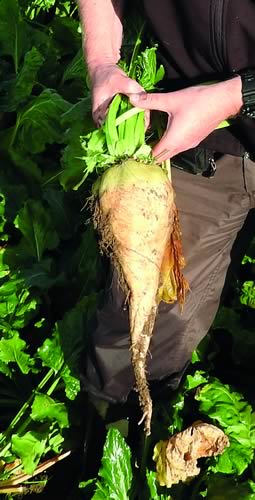2018-03-19 |
Beet with AD Potential fares well in UK Trials
New varieties of high dry matter energy-dense beet now available in the UK are making the crop more viable as a feedstock for anaerobic digestion (AD).
So says Francis Dunne of Field Options, who points to the latest UK trials where new varieties have excelled and demonstrated their potential for the renewable energy sector.
Acker energy beet
Independent fodder beet trials carried out in Cambridgeshire in 2017 compared the performance of 14 leading varieties from five different breeders, encompassing the full range of beet types from low dry matter (fodder beet for grazing) through to very high dry matter types.
“Clean lifting, very high dry matter beet is one of the most efficient feedstocks available for AD,” says Francis Dunne. “Optimising yield of the crop further increases gas yield per hectare.
“The variety Acker, bred in Germany by Strube, specifically for the AD market, is set to take greater market share. It stood out in both 2016 and 2017 trials, with top dry matter yield in 2017 producing 8.8t/ha more roots over the control variety, KWS Gerty. Dry matter percentage was almost identical.
“These very high dry matter types do sit deeper in the soil than more traditional fodder beets, so root cleanliness is a key factor. In the case of Acker, it appears to have relatively clean lifting roots.
“Establishment vigour of Acker is good and it develops good ground cover. Resistance to leaf disease was excellent in a season when disease pressure was high. It produces very large tops that also help to provide frost protection when harvesting late.”
Field Options provides expertise and access to varieties across the full range of beet, from low dry matter fodder beet for grazing through to very high dry matter energy beet for both livestock feed and AD plants.


